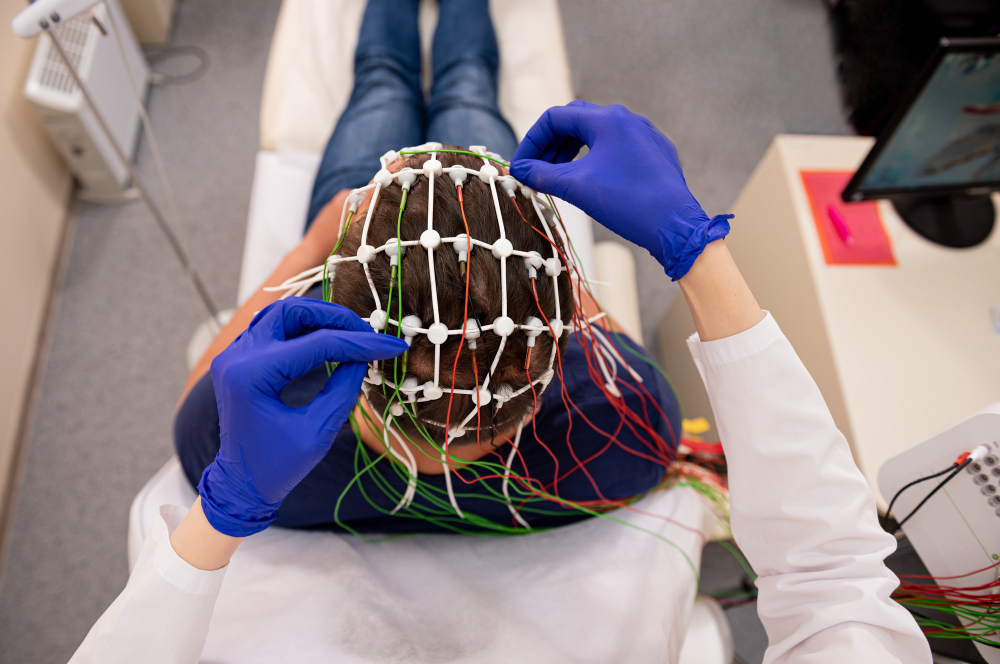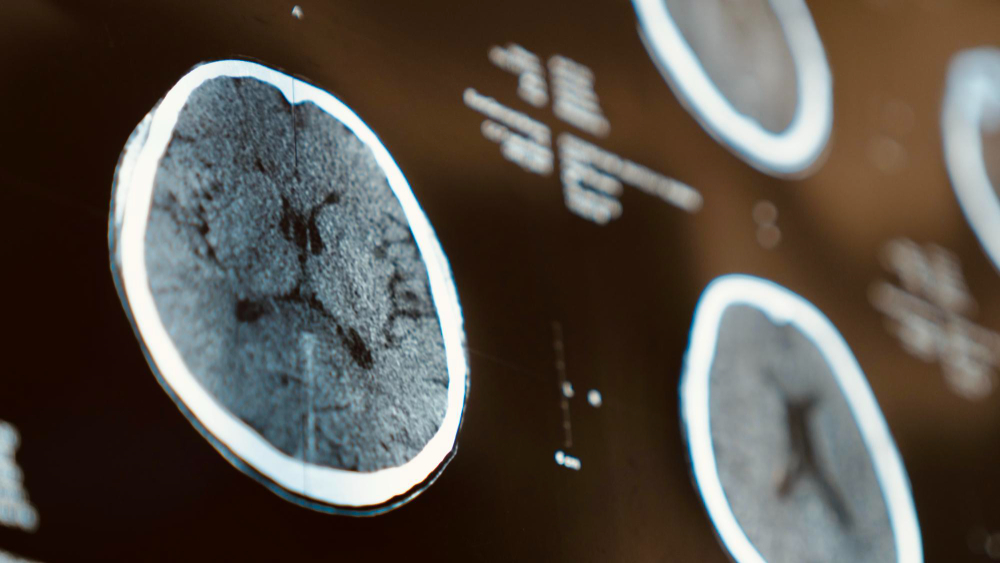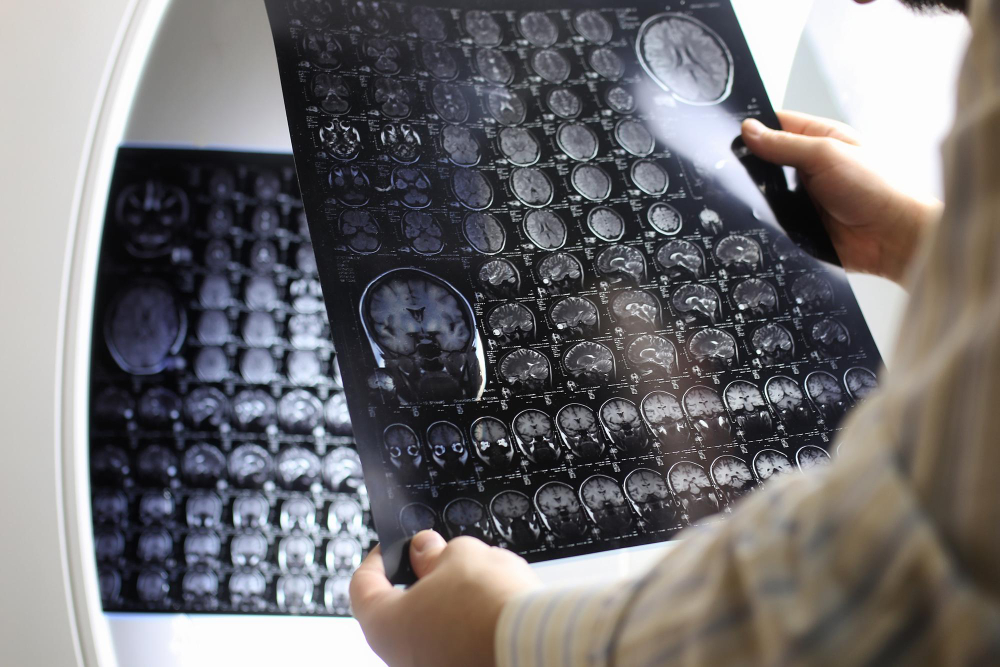Deep Brain Stimulation
Deep brain stimulation (DBS) is a therapy that utilizes a device that has been implanted in your body to transmit an electric charge to specific regions of your brain. This charge improves the functioning of those areas. It is commonly used to treat ailments such as Parkinson’s disease and epilepsy, but scientists are examining its potential for treating various other conditions as well.

How does deep brain stimulation work?
Dysfunctions in the controlling areas of the brain that regulate movement often lead to motion-related manifestations in Parkinson’s disease and other neurological disorders. The disorderly electrical signals causing tremors and other symptoms are interrupted by DBS, which proves to be an effective solution.
Neurosurgeons conduct a sequence of examinations to figure out the best location, and then insert one or more wires known as “leads” into the brain. These leads are linked to a tiny neurostimulator (an electrical generator) that is placed beneath the collarbone, just like a heart pacemaker, via an insulated wire. The neurostimulator transmits constant electric pulses through the leads and into the brain.
Several weeks after the implantation of the neurostimulator, the doctor configures it to emit an electrical impulse. This operation may require multiple appointments over a period of several weeks or months in order to guarantee that the signal is properly set and that good outcomes are being attained. The practitioner strives to strike a good balance between enhancing symptom management and reducing unpleasant side effects by making adjustments to the device.
Who is a candidate?
If you are in a situation that meets the requirements, then you are possibly eligible for DBS.
- The symptoms (including tremors and stiffness) of a movement disorder are getting worse and the effectiveness of the medications is decreasing.
- Disturbing episodes of time when the effect of your medication decreases before the subsequent dose can be consumed.
- Periods of concern arise when medication leads to the development of dyskinesias, characterized by excessive twisting or wriggling movements of the head, torso or limbs.
If you have severe untreated depression, advanced dementia, or Parkinson’s symptoms that are atypical, then DBS may not be suitable for you.
DBS can help treat symptoms caused by:
- Parkinson’s disease is characterized by the presence of tremors, stiffness, and a reduced capacity for movement, which is brought on by the degeneration of nerve cells responsible for producing dopamine. These cells play a critical role in sending signals that govern the body’s ability to move.
- Essential tremor refers to the uncontrolled, rhythmic shaking of the hands and arms that occurs even when they are at rest or when being used for a specific purpose. This condition can also cause a shaking motion in the head that resembles a “no” motion.
- Dystonia refers to the uncontrollable movements and extended muscle tension which results in unusual body movements, distorted posture and trembling. It can occur throughout the body or only in a specific region. Sensory tricks, like touching the face, eyebrows or hands may help to alleviate spasms.

A group of experts, consisting of a neurologist, neuropsychologist, and neurosurgeon, will assess your situation to decide if an operation is feasible. They will assess your cognitive function, memory, present medicines, and overall well-being. Your movements, such as walking, finger tapping, and getting up from a chair, will be recorded on video both with and without medication. The Unified Parkinson Disease Rating Scale (UPDRS) is employed to gauge your symptoms and capabilities.
Once your evaluation and videotaping are done, your case will be reviewed in a conference attended by various medical professionals such as physicians, surgeons, and nurses. Together, they will determine the most suitable treatment plan for your condition. If the team believes that you are eligible for DBS, you will be notified to arrange an appointment with a neurosurgeon.
Treatment
Non-Surgical Treatments
Doctors will explore other treatments before considering surgical interventions like DBS.
- Medications
- Physical Therapy
Surgery
Advantages
- Dependent on the symptoms, the procedure can be conducted on either one or both sides of the brain.
- The consequences can be undone and tailored specifically for the medical condition of every patient.
- The settings for stimulation can be changed to reduce the likelihood of negative effects and enhance performance in the future.
- The apparatus is capable of maintaining symptoms in check without interruption for a complete day.
- Individuals who have received DBS treatment have the option to engage in future advancements in medicine, such as stem cell or gene therapies.
Conditions that might benefit from DBS
Scientists are examining the potential of DBS to alleviate other illnesses. These illnesses encompass conditions that could potentially derive benefits from DBS.
- Addictions.
- Alzheimer’s disease.
- Anxiety.
- Cluster headaches.
- Eating disorders.
- Schizophrenia.
- Intense agony conditions, primarily resulting from nerve or brain-related ailments or incurable illnesses like cancer.
- Severe, medication-resistant depression.
- Tourette syndrome.
It is essential to remember that although DBS may be useful for the listed conditions, its effectiveness is yet to be verified by experts. It often requires extensive research and clinical trials taking several years to establish whether DBS can be beneficial for such medical conditions. At present, DBS surgery is not prevalent for treating these conditions while researchers continue to investigate.

Risks
DBS has been proven secure and efficient in suitable patients. Although there are some potential side effects and hazards, they are generally minor and treatable.
Risks may include:
- There is a 1% chance of experiencing bleeding in the brain, which may also result in a stroke.
- Infection
- Device malfunction
- Lack of benefit for certain symptoms
- Headache
- Worsening mental or emotional status
Possible adverse reactions during stimulation may comprise:
- Temporary tingling in the face or limbs
- A feeling of pulling in muscles
- Speech or vision problems
- Loss of balance
What benefits does deep brain stimulation (DBS) offer?
There are various benefits associated with DBS, comprising:
- DBS can provide an alternative treatment avenue for cases where medications do not yield positive results. DBS is recommended in situations whereby medications fail to produce the desired effect or cease to be effective. In cases of Parkinson’s disease, medications lose their effectiveness as time passes and consequently, require an increase in dosages by healthcare providers. This often leads to additional side effects. In comparison, DBS results in lower dosages of medication, which becomes effective in managing symptoms, and a decrease in side effects.
- DBS treatment can have a profound impact on a person’s life, potentially even saving it. Certain ailments treated by DBS can result in debilitating effects, making ordinary activities impossible. Through DBS treatment, these conditions can be treated and symptoms improved, allowing for a better quality of life. In cases where surgery is not an option, such as medication-resistant epilepsy, DBS can provide hope and significantly decrease the frequency of seizures.
- The pulse generator’s settings can be customized by your healthcare provider to discover the most effective option for you.
- The process is able to be undone: If DBS does not produce positive results or causes intolerable side effects, a subsequent surgical procedure can take out the pulse generator and the leads.
Treatment in Türkiye:
The medical staff of surgical teams, doctors and consultants in Rehab Türk can provide the best treatment options and free consultations – by striving to keep abreast of the latest medical technologies and methods.

